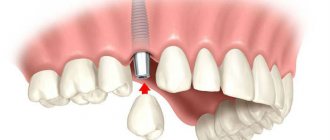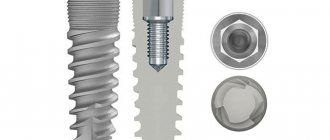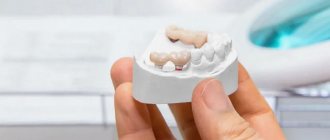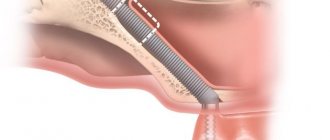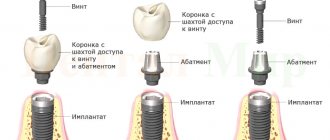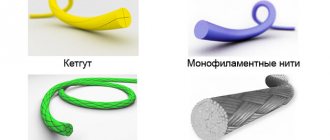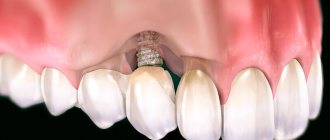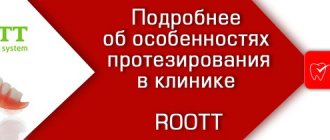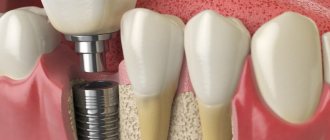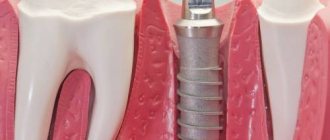Is it possible to get implants for HIV? When is it possible? When is it not possible? Failures during implantation What methods are suitable ROOTT implants for HIV Recommendations Can implantation be refused? Is it worth hiding the status Alternatives Risk of infection during implantation
Acquired immunodeficiency syndrome (AIDS) is the last stage of HIV infection. The body's ability to resist infections and diseases rapidly decreases, which affects organs and systems. Until recently, implantation with HIV was considered impossible. The emergence of one-stage minimally invasive techniques has made it possible to implant implants in people with severe chronic pathologies, incl. HIV and AIDS. The implantation design of RUTT successfully takes root even in patients diagnosed with immunodeficiency or hepatitis.
Is it possible to get implants for HIV?
Immune system diseases suppress the body's ability to detect and destroy pathogens. A defective immune system is unable to resist the attack of pathogens. The ability of tissues to naturally regenerate also decreases. The risk of dental implant failure in patients with a history of complications increases by 80%.
The emergence of one-stage technologies has significantly reduced the list of contraindications to implantation - today immunodeficiency is not an obstacle to implant-based prosthetics.
When is implantation performed?
Dental implantation for HIV and AIDS is possible with normal CD4 cell counts and the absence of negative symptoms. Preparation for surgery involves a complex of laboratory and instrumental studies. In addition to the standard set of tests, a patient with immunodeficiency donates blood for the number of CD4 lymphocytes and viral load. Implantation is performed when CD4 cell counts are relatively high and there are no adverse symptoms.
- With a CD4 count of more than 500, the risk of complications is the same as in patients without immunodeficiency.
- If the CD4 cell concentration is 450-400, the risk of artificial root rejection increases, but surgery is possible.
- If the CD4 count is 350 or less, surgery cannot be performed. In this case, antiretroviral therapy should be continued. Once stable CD4 counts are achieved, the doctor will consider dental implantation.
With a very reduced immune status, the risk of pathogenic microflora growing along the implant is very high. That is, the likelihood of re-implantitis and, as a consequence, rejection of the artificial root increases many times over.
Recommendations after surgery
After implantation, you must scrupulously follow your doctor’s recommendations regarding oral care immediately after the intervention and beyond. This applies to all patients, but HIV-positive patients must especially strictly follow all medical instructions. Post-intervention recommendations include:
- oral care;
- lifestyle changes;
- service in the clinic.
Oral care
- Brush your teeth twice a day, paying attention to the spaces between teeth;
- use dental floss;
- rinse your mouth every time after eating;
- avoid too hard foods (nuts, roasted vegetables);
- Visit your dentist every 6 months for professional hygiene cleaning.
In the early postoperative period (7-10 days), oral antiseptic baths are performed after meals.
General recommendations after surgery
- Limit sports and physical activity for a month;
- avoid hypothermia or overheating;
- give up alcohol and smoking for at least a month;
- no air travel for 10-14 days;
- carefully sneeze, cough, blow your nose, especially if the implantation was done in the upper jaw;
- Do not skip preventive examinations at the dentist.
After installation of the implants, the doctor will prescribe a short course of antibiotic therapy. Maintaining normal CD-4 cell levels is important, so antiretroviral therapy (if prescribed) should not be ignored.
Why Roott implants are the best solution for HIV infection
ROOTT implants are made of biocompatible titanium with an antimicrobial surface. When the sterile packaging of the implantation system is opened, the titanium reacts with oxygen. This promotes the formation of a special hydroxyapatite film on the surface of the implant. Since hydroxyapatite is the main component of bone tissue, the chance that the jawbone will not reject the titanium root increases many times over. The polished surface of the implant prevents the accumulation of bacterial plaque in the cervical area, minimizing the risk of developing peri-implantitis.
Where to place implants
The ROOTT clinic in Moscow is one of the few dental centers in Russia that specializes in one-stage implantation with immediate loading. Our implantologists have been working with the basal protocol for many years. The presence of HIV or AIDS in a patient is not a valid reason for refusing dental implantation. Our specialists will carefully study your medical history and offer the best option for restoring your dentition. Thanks to the ability to combine protocols in one system, treating patients with a complicated medical history is not a problem for us.
Recommendation on how to protect yourself from implant rejection
It is important to exclude the options that we have given above, which may cause side effects.
When implanting tissues are always damaged, it is a bloody operation
Taking medications prescribed by your doctor and proper regular oral hygiene are an important part of prevention for proper healing.
When deciding on a transplant, do not forget that bad habits, kidney and liver diseases, diabetes and even sinusitis can cause rejection. If you cannot change your HIV status due to the nature of the disease, but you can cure others, or refuse implantation.
Removable prosthetics
Removable dentures are an easy way to replace missing teeth, regardless of the state of the immune system. The main disadvantages of the method:
- Does not prevent bone atrophy;
- restores chewing function by only 60%;
- removable orthopedic systems cannot be used in the presence of opportunistic diseases of the oral cavity (aphthous stomatitis, exfoliative cheilitis, Kaposi's sarcoma, etc.).
With the help of removable structures, you can replace both several missing teeth and an entire row of teeth.
Mini implantation
Lightweight mini-implants are implanted through micro-punctures. They can be installed even in the narrowest area of the bone without pre-building it. They are characterized by rapid healing and securely hold the removable denture in the mouth. They are not intended for heavy chewing loads, therefore they are not suitable as a support for a permanent denture.
Mini-implantation and removable prosthetics are a good alternative during antiretroviral therapy.
As soon as CD 4 cell counts are stabilized, basal implantation is recommended.
Possibility of infection in the dentist's chair
The risk of contracting HIV or AIDS in the dentist's chair is zero, since all manipulations are carried out under conditions of absolute sterility. Anti-epidemic measures and sterilization at the RUTT clinic are carried out in accordance with the AntiAIDS-AntiHEPATITIS program, regardless of the type of treatment performed. Only disposable consumables are used (sterile gloves, masks, napkins, disposable instruments). After use, consumables and disposable instruments are disposed of.
back side
In February 2022, a doctor from one of the state clinics near Moscow contacted the AIDS.CENTER Foundation. An elderly woman works as a dentist. In winter, a patient came to her complaining of acute toothache. Since she admitted that she had HIV infection, the woman did not dare to use a standard instrument, believing that in such cases it requires some kind of “special” disinfection, and asked the manager to give her one that had been written off and was not used for working with ordinary clients.
While manually cleaning the canals with it, she accidentally pricked her finger, and the patient’s blood got under the glove. “I took off the glove, washed it with running water, put it on and started working again. According to SanPiN, after I finish the tooth, I must warn the head nurse and the manager about the emergency,” says the dentist. - After I released the patient, and she was satisfied, after all, I am a good doctor and did my job conscientiously, I ran to the head doctor, to the office where she sits with the deputy. I say that I had “such” a patient, I was damaged. And she told me: “Go, you are free!” “She screamed, laughed together with the deputy and sent me to the reception.” If the elderly woman had used a standard tool, the damage most likely would not have occurred, the interlocutor agrees. But even after the injury had already happened, no one even thought to inform her about the actions that she should have taken to protect herself in the current situation.
Suddenly, the elderly doctor herself found herself in the patient’s place: after telling her relatives about the incident, she cried all night: “My sister died with her husband, she left three children. Four more are mine, we need to feed them, raise them, my husband and I work together.” Fortunately, one of her colleagues advised her to call the regional AIDS center, whose staff explained: there are medications that, if taken within 72 hours after the incident, can prevent the development of infection.
How the diagnosis could have turned out for her - says another ward of the Foundation, also a dentist near Moscow. After he himself received HIV, the man was immediately fired from the clinic. Only six months later did he manage to find a new place, and only thanks to the fact that, while undergoing a medical commission, he convinced the private clinic that performed him not to paste the blood test results into the card, printing them out on a separate sheet and handing them over (that is, hiding his HIV status from the new employer).
Questions and answers
Is it possible to completely implant the upper and lower jaw
Good day. I wanted to know if complete implantation of the upper and lower jaw is possible, since I have the absence of almost all teeth due to the genetic disease anhydrotic ectodermal dysplasia. I've been wearing dentures since I was 6 years old.
Hello! Currently, at the SIMPLADENT center on Dmitrovskaya there is a promotion for complex basal implantation of both jaws. The cost of implantation, taking into account all manipulations (diagnosis, orthopantomogram, installation of implants, anesthesia, installation, adjustment of prostheses, subsequent preventive examinations) and prostheses within the framework of the promotion is 450,000 rubles. The promotion is valid only until July 30, 2011. Since you have been using removable dentures for a long time, the bone may have severely atrophied. You need to attend a consultation with an implantologist to assess the condition of the bone and determine which method of implantation and prosthetics is right for you. As for the disease you indicated, it does not affect the condition of the bone, so implantation in your case is theoretically possible. We invite you to a free consultation with a doctor at one of the center’s clinics. The doctor will examine the oral cavity, tell you exactly what measures are needed to prepare for basal implantation, and give directions for tests. Because there are a number of contraindications for any type of implantation, you can find them in the “Indications and Contraindications” section. Sincerely, SIMPLADENT++ Patient Support Center 7 (495) 789-35-82
Hello. Is full implantation possible for periodontal disease? It’s difficult to say the stage of the disease. Visually - loose gums, protrusion, loosening and partial loss of teeth. Therapeutic treatment gives a temporary positive result.
Hello. Is full implantation possible for periodontal disease? It’s difficult to say the stage of the disease. Visually - loose gums, protrusion, loosening and partial loss of teeth. Therapeutic treatment gives a temporary positive result.
Hello! Gum diseases are not an absolute contraindication to dental implantation; in each case, the possibility of installing implants is determined individually. The use of root-shaped implants in your case is not recommended, since due to problems with the gums they may not take root. In order to definitively answer whether BOI implantation is right for you, a direct examination and photograph of the jaw is necessary. Sign up with us for a free consultation, the doctor will take a picture (orthopantomogram, done free of charge as part of the consultation), and then inform you about the possibilities of dental restoration in your case. We also recommend that you familiarize yourself with the list of absolute contraindications to implantation (these are blood diseases, some chronic diseases, etc., which may cause implant failure). Read more about contraindications on our website in the section Indications and contraindications for dental implantation. Sincerely, SIMPLADENT Patient Support Center + + 8-800-333-53-41
Other questions
How long do implants take to take root and when can they be rejected?
If we consider a positive scenario, then the installed implant will completely take root within a year. The maximum period after implantation during which problems may appear is 2 years.
Within 4-8 months, the implantation site may only heal. If the advertisement indicates that installation takes 2 days, then know that the marketers forgot to indicate that photographs, impressions or scans need to be taken, implantation and an adaptation (rehabilitation) procedure must be carried out.
You need to understand that problems can begin on the second day after implantation. But it is important to understand that problems may arise during any medical operation. Even after a painkiller injection, you can die, but the problem is purely a professional problem, it does not depend on your HIV status.
An experienced doctor will be able to install the implant, causing minimal damage to the tissue and ensuring healing.
Let's look at situations in which problems may arise.
